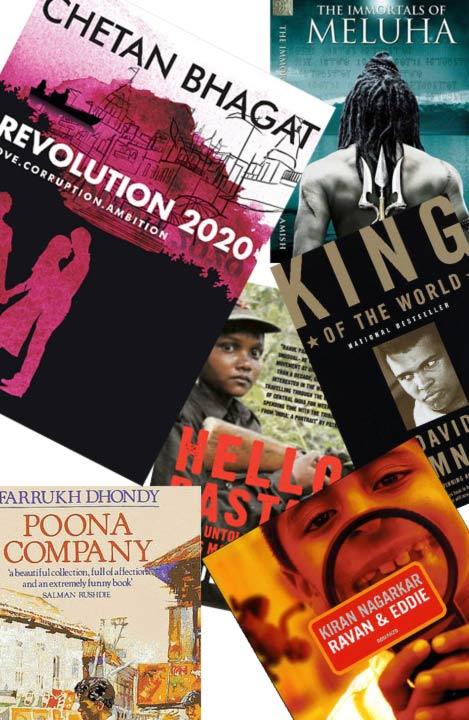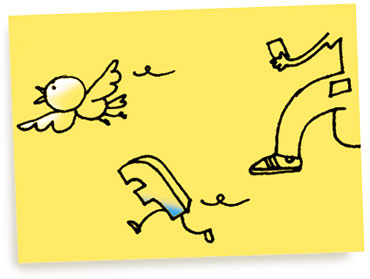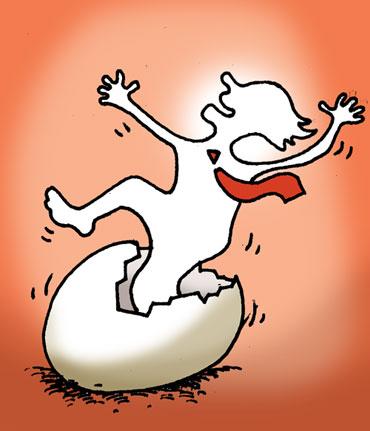Divya Nair
From finding the right publisher to having faith in and defending your own work, here are some tips every aspiring writer should keep in mind.
In 1889, Rudyard Kipling's draft for a short story was turned down by The San Francisco Examiner with the note, "I am sorry, Mr. Kipling, but you just do not know how to use the English language."
If the Mumbai-born author had bought that criticism at the time, his career would not have survived to win the Nobel Prize for Literature in 1907.
Leading international authors like JK Rowling (of Harry Potter fame) and John Grisham also faced rejections for their early work before they defied the critics and went on to become bestsellers.
That could also be a reason why publishers across the globe think twice before rejecting a new author today.Back home, the list of bestselling authors in the country that was once dominated by the likes of Jeffery Archer and Sidney Sheldon has been replaced by young Indian talents like Chetan Bhagat, Arvind Adiga, Amitav Ghosh and Amish Tripathi.
But how many of us really have it in us to become the next Rushdie or Bhagat?
At the recently-concluded IIM Ink conference, which was held in Mumbai and attended by leading and upcoming writers from the IIM (Indian Institute of Management) fraternity, the likes of Amish Tripathi, Ravi Subramanian, Rashmi Bansal and Santosh Desai shared their experiences, right from being rejected by publishers to becoming bestsellers. Each of them also talked about the mistakes they made as beginners and the lessons they learnt along the way. So here are eight tips for aspiring writers from the bestsellers.
Please click NEXT to continue reading...
For life lessons from each of the distinguished authors at the IIM Ink conference, please click here.
1. Strategic plans don't work
Most young writers who've aspired to write immediately after their graduation or MBA confessed to having struggled with a plan.
Bestselling author Amish Tripathi, who has titles like The Immortals of Melluha and The Secret of the Nagas to his credit tells us why planning did not work for him.
"When I first sat down to write my book, like all disciplined MBAs, I formulated a strategic plan. I carefully listed the number of chapters and the word count for each chapter. But I realised that it was going nowhere."
"Weeks passed, but I could not start my book. That's when my wife suggested that I move beyond my MBA way of doing things and focus on telling the story."
"I learnt my first lesson that day -- strategic plans don't work for writers. You have to let the story lead you to the book."
Illustration: Dominic Xavier
2. Don't let the publisher decide the fate of your book
Although Amish Tripathi is a bestselling author today, his first book was rejected by almost every publisher.
"It was depressing, initially. But when the number of rejections crossed 20, I stopped counting," says the IIM-Calcutta alumnus.
He was told by the publishers that the subject of the book (religion) was difficult to sell.
"I did not do market research before writing the book," reasons Tripathi who had to self-finance the initial copies of The Immortals of Meluha.
It was important for Tripathi to believe in his book and that helped.
"I was lucky, the first set of copies sold off in the first week and publishers agreed to print the next lot."
Meanwhile, Rashmi Bansal, whose bestselling books include Stay Hungry Stay Foolish and Connect the Dots insists that one should not let the publisher or editor decide the fate of his/her books.
"When I was a young author, I would take criticism very dearly. But now, after publishing two books, I have a fair idea about the market and the audience for my books. When I send manuscripts, I ask editors to proof-read for grammar and spelling errors. I don't let them rewrite or edit the whole passage," she explains.
Illustration: Uttam Ghosh
3. Having a good profile helps
The fact that IIMs have produced some of the bestselling Indian authors in recent times is reason enough for publishers to believe that authors from leading b-schools are worth investing time and efforts in, says banker-turned-author Ravi Subramanian.
Subramanian, who has authored If God Was a Banker and I Bought the Monk's Ferrrari says that having studied at IIM-Bangalore worked for him and he credits the change in trend to writers like Chetan Bhagat, Amish Tripathi and Rashmi Bansal.
"Publishers take IIM graduates seriously now. They know that books written by IIM authors will sell a minimum of 5-10,000 copies, which is not a bad start for debutantes."
And if you have not studied at the top-ranked institutions or worked for any of the Fortune 500 companies, you may want to pull up your socks and work harder to push your idea.
Illustration: Dominic Xavier
4. Have a strong marketing plan
Apparently, your books are only as good as your marketing plans
Interestingly, Chetan Bhagat was among the first few Indian authors who introduced the idea of sending a marketing plan along with the manuscript to publishers.
Although the idea was laughed upon, publishers today encourage authors to start thinking of new ways to promote/sell their works.
"When Chetan did it, people thought it was a gimmick. But today, most authors use Facebook and Twitter to promote their book and sell their ideas," says Gautam Padmanabhan, CEO of Westland Publishers.
Ask debutante authors like Kartik Sharma of The Quest of the Sparrows and they will tell you how social media marketing also helps them stay in touch with readers.
"Most people use Facebook to build curiosity before the book is released. But I believe that even after that, you have to find ways to creatively engage readers to come back to your site or discuss your book," asserts Sharma, who has successfully managed to keep the buzz alive months after releasing the book.
Speaking of creative marketing strategies, Amish Tripathi, who distributed free samplers of the first chapter of his book a few weeks before the release says it helped build curiosity among readers.
"We also made a video presentation which featured ace musician Taufiq Qureshi, which acted like a preview to the book release," shares Tripathi.
However, the knack lies in coming up with innovative ideas each time, insist both Padmanabhan and Tripathi.
Illustration: Dominic Xavier
5. Know when to depend on writing for a living
Rashmi Bansal, who quit her job to pursue writing as a full-time career says that India is not ready for 'full-time authors'.
"Most people look at my visiting card and ask: so, you are an author, but what do you do otherwise? I tell them that I am a full-time author. But they are not convinced," shares Bansal.
If you are a passionate writer, the ideal time to start writing a book is while you are studying or alongside your first job. But then if you want to turn to books for a living, you must know when to strike.
Ravi Subramanian says writing your first book while you are working gives you the freedom to write without worrying about what the outcome will have on your future.
"When you have a steady income, you can focus on writing creatively, without worrying about the book's performance in the market. Your books should be an extension of your freedom to write. That's what makes you enjoy writing."
A full-time author invites the risk of writing for commercial success, which may limit your creativity, he added.
However, people like Amish Tripathi can only be glad that they quit their jobs to follow their passion.
When asked if he earns enough off of his books for a living, Tripathi was honest enough to say, "Yes, I am making good money from my books now. So I can afford to become a full-time author."
Illustration: Uttam Ghosh
6. Be proud of your work
If you have invested your time and ideas in bringing out a book, you should not be ashamed of asking people to buy it, feels Ravi Subramanian.
While it is important to welcome positive criticism, one should never be apologetic about one's work.
"Nothing sells by itself. Even if the whole world is against your idea, you should not lose faith in your efforts. It's not a crime to talk about your own work," says Amish Tripathi.
Illustration: Uttam Ghosh
7. Price your book upward of Rs 200
The idea of making profits from your book may not occur to you while you are writing your first book. That's why it is important for you to consult senior writers and publishers before you decide upon the price.
Ravi Subramanian says a young writer must price his/her book upward of Rs 200 per copy, so that s/he is able to make a good profit.
If you want to be a full-time author, you must write a book every year. "You earn through royalties," adds Amish Tripathi.
Illustration: Uttam Ghosh
8. Think original
In this digital age, where every second person you know is involved in sharing ideas with the world through Facebook wall posts, Twitter feeds and blogs, it is important for you to produce something that's strikingly new.
"Before you start writing a book, always ask the question: who's listening?" suggests Santosh Desai, CEO, Future Brands India Ltd and author of the bestseller Mother Pious Lady- Making Sense of Everyday India.
You must either have a new story to share with the world or you should be able to retell a story in a way that's not been heard before.
And for that to happen, Amish Tripathi says, Indian authors must learn to believe that they have the ability to surprise global audiences with a script that's truly Indian in terms of characters and plot, rather than ape a Western book.
Illustration: Dominic Xavier










Comment
article